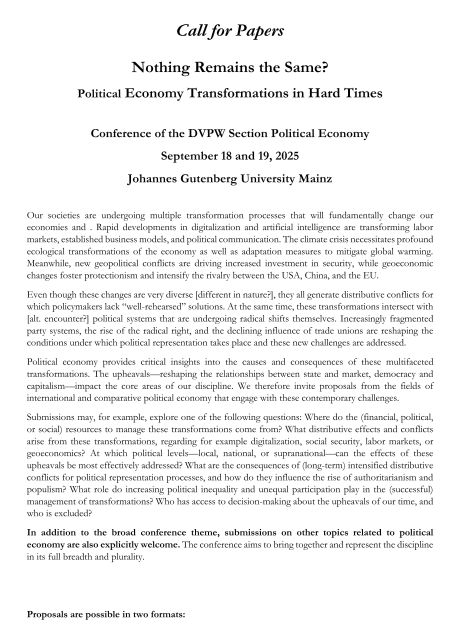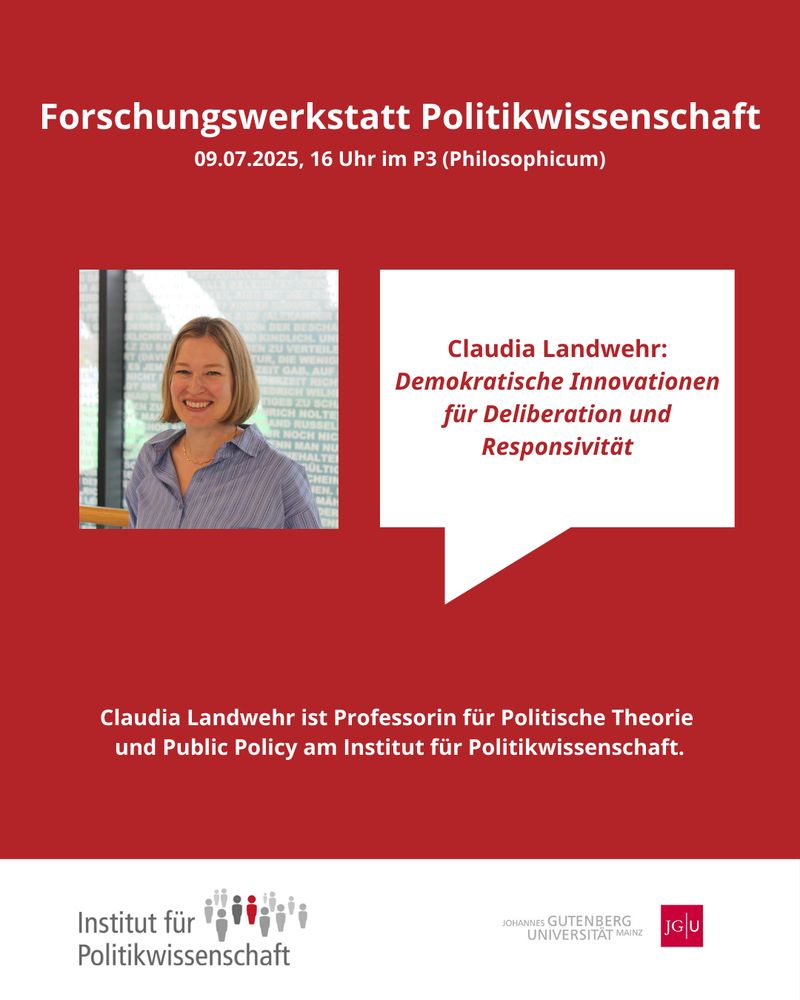
Julian Frinken
@jfrinken.bsky.social
PhD student @ Johannes Gutenberg University Mainz
Political Theory
trying to unpack the representative claim of mini-publics
Political Theory
trying to unpack the representative claim of mini-publics
Reposted by Julian Frinken
Wenns nicht so traurig wäre, wäre es lustig. Beim #Klima hat das China-Argument die Seiten gewechselt. Früher: Was sollen wir uns anstrengen, wenn die Chinesen alles verderben. Heute: Wir schaffen es zwar nicht, aber die Chinesen bauen die Regenerativen aus wie Hölle. (Übrigens, beides falsch)
November 10, 2025 at 7:24 AM
Wenns nicht so traurig wäre, wäre es lustig. Beim #Klima hat das China-Argument die Seiten gewechselt. Früher: Was sollen wir uns anstrengen, wenn die Chinesen alles verderben. Heute: Wir schaffen es zwar nicht, aber die Chinesen bauen die Regenerativen aus wie Hölle. (Übrigens, beides falsch)
Reposted by Julian Frinken
Very proud of my PhD student @kwalz.bsky.social who successfully defended his thesis on "Pathways to breakdown resilience" today and is now Dr. (des.) Kevin Walz 🎉
Watch out for his book to learn how accountability can stop autocratization!
In Picture: Kevin🧑🎓, Natasha Wunsch, 2nd supervisor and me 😀
Watch out for his book to learn how accountability can stop autocratization!
In Picture: Kevin🧑🎓, Natasha Wunsch, 2nd supervisor and me 😀

October 30, 2025 at 2:06 PM
Very proud of my PhD student @kwalz.bsky.social who successfully defended his thesis on "Pathways to breakdown resilience" today and is now Dr. (des.) Kevin Walz 🎉
Watch out for his book to learn how accountability can stop autocratization!
In Picture: Kevin🧑🎓, Natasha Wunsch, 2nd supervisor and me 😀
Watch out for his book to learn how accountability can stop autocratization!
In Picture: Kevin🧑🎓, Natasha Wunsch, 2nd supervisor and me 😀
Reposted by Julian Frinken
"Warum junge Männer die AfD wählen – und junge Frauen die Linke"
- (unter anderem) darüber habe ich mit dem Handelsblatt gesprochen: www.handelsblatt.com/politik/deut...
- (unter anderem) darüber habe ich mit dem Handelsblatt gesprochen: www.handelsblatt.com/politik/deut...

September 17, 2025 at 2:15 PM
"Warum junge Männer die AfD wählen – und junge Frauen die Linke"
- (unter anderem) darüber habe ich mit dem Handelsblatt gesprochen: www.handelsblatt.com/politik/deut...
- (unter anderem) darüber habe ich mit dem Handelsblatt gesprochen: www.handelsblatt.com/politik/deut...
Reposted by Julian Frinken
I am looking for a PhD student in Comparative Politics @powimz.bsky.social. My research focuses on political (in-)equality, representation, and responsiveness. I would be grateful if you could help to spread the word.
stellenboerse.uni-mainz.de#/jgu/job/49637
stellenboerse.uni-mainz.de#/jgu/job/49637
stellenboerse.uni-mainz.de
August 7, 2025 at 8:11 AM
I am looking for a PhD student in Comparative Politics @powimz.bsky.social. My research focuses on political (in-)equality, representation, and responsiveness. I would be grateful if you could help to spread the word.
stellenboerse.uni-mainz.de#/jgu/job/49637
stellenboerse.uni-mainz.de#/jgu/job/49637
Reposted by Julian Frinken
I'm delighted to see this article out in @govandopp.bsky.social! Jonas Wenker and I show that losing an election has a far stronger negative effect on populist voters than on non-populist ones. For populists, losing signals that the system is broken. 1/5 www.cambridge.org/core/journal...
Losers’ Dissent: How Election Results Shape Populists’ Satisfaction with Democracy | Government and Opposition | Cambridge Core
Losers’ Dissent: How Election Results Shape Populists’ Satisfaction with Democracy
www.cambridge.org
August 4, 2025 at 5:20 PM
I'm delighted to see this article out in @govandopp.bsky.social! Jonas Wenker and I show that losing an election has a far stronger negative effect on populist voters than on non-populist ones. For populists, losing signals that the system is broken. 1/5 www.cambridge.org/core/journal...
Reposted by Julian Frinken
Are policy and process preferences structured by the same ideological dimensions? In a new paper now out in journals.sagepub.com/toc/iptb/21/2 I argue that policy preferences are associated with support for different logics of collective decision-making. More empirical research in the making!

July 21, 2025 at 12:37 PM
Are policy and process preferences structured by the same ideological dimensions? In a new paper now out in journals.sagepub.com/toc/iptb/21/2 I argue that policy preferences are associated with support for different logics of collective decision-making. More empirical research in the making!
Reposted by Julian Frinken
Reposted by Julian Frinken
🎧 HÖRTIPP: #Forschungspodcast #MindsOfMainz – #DerGutenbergTalk | Folge 24: Wehrhafte #Demokratie – ein Bekenntnis zu Freiheit und gemeinsamen Werten | mit Prof. Kai Arzheimer 👉 www.magazin.uni-mainz.de/minds-of-mai...
@kai-arzheimer.com @powimz.bsky.social
#Politikwissenschaft #Innenpolitik
@kai-arzheimer.com @powimz.bsky.social
#Politikwissenschaft #Innenpolitik


July 1, 2025 at 2:19 PM
🎧 HÖRTIPP: #Forschungspodcast #MindsOfMainz – #DerGutenbergTalk | Folge 24: Wehrhafte #Demokratie – ein Bekenntnis zu Freiheit und gemeinsamen Werten | mit Prof. Kai Arzheimer 👉 www.magazin.uni-mainz.de/minds-of-mai...
@kai-arzheimer.com @powimz.bsky.social
#Politikwissenschaft #Innenpolitik
@kai-arzheimer.com @powimz.bsky.social
#Politikwissenschaft #Innenpolitik
Reposted by Julian Frinken
Today in our departmental seminar: Professor Simone Chambers speaking about the future of #democracy


May 28, 2025 at 2:24 PM
Today in our departmental seminar: Professor Simone Chambers speaking about the future of #democracy
Reposted by Julian Frinken

May 26, 2025 at 10:15 AM
Reposted by Julian Frinken
People often overestimate how many others share their views—a phenomenon known as the false consensus effect.
In a new article in @ispp-pops.bsky.social, @clandwehr.bsky.social, Philipp Harms and I show that this tendency is associated with stronger populist attitudes: doi.org/10.1111/pops....
In a new article in @ispp-pops.bsky.social, @clandwehr.bsky.social, Philipp Harms and I show that this tendency is associated with stronger populist attitudes: doi.org/10.1111/pops....

April 22, 2025 at 7:05 AM
People often overestimate how many others share their views—a phenomenon known as the false consensus effect.
In a new article in @ispp-pops.bsky.social, @clandwehr.bsky.social, Philipp Harms and I show that this tendency is associated with stronger populist attitudes: doi.org/10.1111/pops....
In a new article in @ispp-pops.bsky.social, @clandwehr.bsky.social, Philipp Harms and I show that this tendency is associated with stronger populist attitudes: doi.org/10.1111/pops....
Reposted by Julian Frinken
Looking forward to this semester's Political Science Research Lab @powimz.bsky.social 🎉
Starting next Wednesday, we have talks by @aleininger.bsky.social, @simonechambers.bsky.social, @manesweisskircher.bsky.social, @christopherojeda.bsky.social, Michael Zürn @wzb.bsky.social and others coming up!
Starting next Wednesday, we have talks by @aleininger.bsky.social, @simonechambers.bsky.social, @manesweisskircher.bsky.social, @christopherojeda.bsky.social, Michael Zürn @wzb.bsky.social and others coming up!

April 16, 2025 at 1:17 PM
Looking forward to this semester's Political Science Research Lab @powimz.bsky.social 🎉
Starting next Wednesday, we have talks by @aleininger.bsky.social, @simonechambers.bsky.social, @manesweisskircher.bsky.social, @christopherojeda.bsky.social, Michael Zürn @wzb.bsky.social and others coming up!
Starting next Wednesday, we have talks by @aleininger.bsky.social, @simonechambers.bsky.social, @manesweisskircher.bsky.social, @christopherojeda.bsky.social, Michael Zürn @wzb.bsky.social and others coming up!
Reposted by Julian Frinken
Anti-pluralism is a term that repeatedly appears in the discussion about early warning signs of dem. backsliding. However, AP often remains un(der)theorized. In this paper I try to clarify what anti-pluralism is & why it is a useful marker for would-be autocratizers👇
doi.org/10.1007/s122...
doi.org/10.1007/s122...

February 5, 2025 at 3:45 PM
Anti-pluralism is a term that repeatedly appears in the discussion about early warning signs of dem. backsliding. However, AP often remains un(der)theorized. In this paper I try to clarify what anti-pluralism is & why it is a useful marker for would-be autocratizers👇
doi.org/10.1007/s122...
doi.org/10.1007/s122...
Reposted by Julian Frinken
Please spread the word! 👇
We are happy to announce that the next conference of the political economy section of the German Political Science association will take place @uni-mainz in September 2025. Join us to discuss "Political Economy Transformation in Hard Times"
Submission deadline February 15
We are happy to announce that the next conference of the political economy section of the German Political Science association will take place @uni-mainz in September 2025. Join us to discuss "Political Economy Transformation in Hard Times"
Submission deadline February 15


January 16, 2025 at 10:30 AM
Please spread the word! 👇
We are happy to announce that the next conference of the political economy section of the German Political Science association will take place @uni-mainz in September 2025. Join us to discuss "Political Economy Transformation in Hard Times"
Submission deadline February 15
We are happy to announce that the next conference of the political economy section of the German Political Science association will take place @uni-mainz in September 2025. Join us to discuss "Political Economy Transformation in Hard Times"
Submission deadline February 15
Reposted by Julian Frinken
Happy to see this piece out in ZfVP🥳 Democratic resilience is a widely discussed topic, but the concept still shows some shortcomings. @lionmert.bsky.social, @matthiasrosenthal.bsky.social, Jana Niedringhaus, Johannes Helgest, and I address these systematically. A🧵:
doi.org/10.1007/s122...
doi.org/10.1007/s122...

January 8, 2025 at 3:42 PM
Happy to see this piece out in ZfVP🥳 Democratic resilience is a widely discussed topic, but the concept still shows some shortcomings. @lionmert.bsky.social, @matthiasrosenthal.bsky.social, Jana Niedringhaus, Johannes Helgest, and I address these systematically. A🧵:
doi.org/10.1007/s122...
doi.org/10.1007/s122...
Meine Rezension von Brigitte Geißels "Demokratie als Selbst-Regieren" ist heute auf dem pw-portal erschienen👇. Gutes Buch, wichtige Diskussion!
Wie lässt sich Demokratie erneuern? Brigitte Geißel (Uni Frankfurt) plädiert dafür, auch Entscheidungen über d. Ausgestaltung demokratischer Systeme in d. Hände der Bürger*innen zu legen. @jfrinken.bsky.social (Uni Mainz) lobt d. Buch als wichtige Intervention im Diskurs um die Krise der Demokratie.

Brigitte Geißel: Demokratie als Selbst-Regieren: Demokratische Innovat
Neuer Beitrag auf dem PW-Portal!
www.pw-portal.de
December 20, 2024 at 8:20 AM
Meine Rezension von Brigitte Geißels "Demokratie als Selbst-Regieren" ist heute auf dem pw-portal erschienen👇. Gutes Buch, wichtige Diskussion!
Reposted by Julian Frinken
Wir gratulieren Johanna Speyer (@JohannaSpeyer) ganz herzlich zur Promotion 🎓🎉!

October 28, 2024 at 4:05 PM
Wir gratulieren Johanna Speyer (@JohannaSpeyer) ganz herzlich zur Promotion 🎓🎉!
Reposted by Julian Frinken
Do citizens in the East and West of Germany still think differently about democracy? A new paper by Lea Stallbaum uses ESS 10 data to show that cohorts socialized in the GDR still hold more socialist and populist conceptions of democracy while the young converge.
www.tandfonline.com/doi/full/10....
www.tandfonline.com/doi/full/10....

September 12, 2024 at 1:42 PM
Do citizens in the East and West of Germany still think differently about democracy? A new paper by Lea Stallbaum uses ESS 10 data to show that cohorts socialized in the GDR still hold more socialist and populist conceptions of democracy while the young converge.
www.tandfonline.com/doi/full/10....
www.tandfonline.com/doi/full/10....
Ich durfte zu dem gerade erschienenen interdisziplinären Sammelband "Kann das Anthropozän gelingen?" einen Text über "Bürger:innenräte als Institutionen demokratischer Klimapolitik" beisteuern. Freue mich, dass so ein vielseitiger und bereichernder Band entstanden ist!

Kann das Anthropozän gelingen?
„Kann das Anthropozän gelingen?" Der Begriff „Anthropozän" fungiert in aktuellen Debatten als Chiffre für eine mehrfache Krise. Empirisch wird der Begriff verwendet, um den von Menschen verursa...
www.degruyter.com
February 5, 2024 at 11:13 AM
Ich durfte zu dem gerade erschienenen interdisziplinären Sammelband "Kann das Anthropozän gelingen?" einen Text über "Bürger:innenräte als Institutionen demokratischer Klimapolitik" beisteuern. Freue mich, dass so ein vielseitiger und bereichernder Band entstanden ist!
Reposted by Julian Frinken
Three great talks in the last 8 days. Eva Krick, Paula Jöst and Theresa Bernemann really kicked it!



December 15, 2023 at 11:59 AM
Three great talks in the last 8 days. Eva Krick, Paula Jöst and Theresa Bernemann really kicked it!
Reposted by Julian Frinken
Wow! I just got the news that our PhD student @matthiasrosenthal.bsky.social has won the Democratic Innovation section's Best Paper Award for his paper presented at ECPR GC in Prague. Congratulations and well deserved, Matthias! 🎉 @kaiarzheimer.bsky.social


December 15, 2023 at 8:01 AM
Wow! I just got the news that our PhD student @matthiasrosenthal.bsky.social has won the Democratic Innovation section's Best Paper Award for his paper presented at ECPR GC in Prague. Congratulations and well deserved, Matthias! 🎉 @kaiarzheimer.bsky.social
Reposted by Julian Frinken
This blogpost provides a concise summary of a paper I presented at the summer school on "Electoral Democracy in Danger!?" organized by @rdassonneville.bsky.social and @rlachat.bsky.social: www.fmsh.fr/en/publicati... This might be interesting to those of you who work on democratic regression 👇

Disruption or Erosion?
Summer School “Electoral Democracy in Danger?”, article by Kevin Walz (University of Mainz)
www.fmsh.fr
December 12, 2023 at 9:33 AM
This blogpost provides a concise summary of a paper I presented at the summer school on "Electoral Democracy in Danger!?" organized by @rdassonneville.bsky.social and @rlachat.bsky.social: www.fmsh.fr/en/publicati... This might be interesting to those of you who work on democratic regression 👇
Reposted by Julian Frinken
The Democracy Seminars have a great series of talks coming up this term! @clandwehr.bsky.social @nilssteiner.bsky.social @kwalz.bsky.social @jfrinken.bsky.social

December 6, 2023 at 10:25 PM
The Democracy Seminars have a great series of talks coming up this term! @clandwehr.bsky.social @nilssteiner.bsky.social @kwalz.bsky.social @jfrinken.bsky.social
Reposted by Julian Frinken
Very happy to see this polisky published: doi.org/10.1016/j.el...!
I use age-period-cohort analysis with data from all 20 German federal elections (1949-2021) to answer 2 questions:
1. How has party support shifted across generations?
2. Has the effect of education on voting changed across gener.?
I use age-period-cohort analysis with data from all 20 German federal elections (1949-2021) to answer 2 questions:
1. How has party support shifted across generations?
2. Has the effect of education on voting changed across gener.?

October 16, 2023 at 6:36 AM
Very happy to see this polisky published: doi.org/10.1016/j.el...!
I use age-period-cohort analysis with data from all 20 German federal elections (1949-2021) to answer 2 questions:
1. How has party support shifted across generations?
2. Has the effect of education on voting changed across gener.?
I use age-period-cohort analysis with data from all 20 German federal elections (1949-2021) to answer 2 questions:
1. How has party support shifted across generations?
2. Has the effect of education on voting changed across gener.?
Reposted by Julian Frinken
I am very happy to have received a copy of our book 'The Democratic Regression'. It is a translation from the German version and offers a political explanation of the rise of authoritarian populism.
polisky
polisky


November 18, 2023 at 10:59 AM
I am very happy to have received a copy of our book 'The Democratic Regression'. It is a translation from the German version and offers a political explanation of the rise of authoritarian populism.
polisky
polisky


